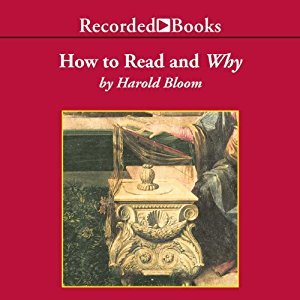What do you think?
Rate this book


How should we read? Slowly, with love, openness, and with our inner ear cocked. Then we should reread, reread, reread, and do so aloud as often as possible. "As a boy of eight," he tells us, "I would walk about chanting Housman's and William Blake's lyrics to myself, and I still do, less frequently yet with undiminished fervor." And why should we engage in this apparently solitary activity? To increase our wit and imagination, our sense of intimacy--in short, our entire consciousness--and also to heal our pain. "Until you become yourself," Bloom avers, "what benefit can you be to others." So much for reading as an escape from the self!
Still, many of this volume's pleasures may indeed be selfish. The author is at his best when he is thinking aloud and anew, and his material offers him--and therefore us--endless opportunities for discovery. Bloom cherishes poetry because it is "a prophetic mode" and fiction for its wisdom. Intriguingly, he fears more for the fate of the latter: "Novels require more readers than poems do, a statement so odd that it puzzles me, even as I agree with it." We must, he adjures, crusade against its possible extinction and read novels "in the coming years of the third millennium, as they were read in the eighteenth and nineteenth century: for aesthetic pleasure and for spiritual insight."
Bloom is never heavy, since his vision quest contains a healthy love of irony--Jedediah Purdy, take note: "Strip irony away from reading, and it loses at once all discipline and all surprise." And this supreme critic makes us want to equal his reading prowess because he writes as well as he reads; his epigrams are equal to his opinions. He is also a master allusionist and quoter. His section on Hedda Gabler is preceded by three extraordinary statements, two from Ibsen, who insists, "There must be a troll in what I write." Who would not want to proceed? Of course, Bloom can also accomplish his goal by sheer obstinacy. As far as he is concerned, Don Quixote may have been the first novel but it remains to this day the best one. Is he perhaps tweaking us into reading this gigantic masterwork by such bald overstatement? Bloom knows full well that a prophet should stop at nothing to get his belief and love across, and throughout How to Read and Why he is as unstinting as the visionary company he adores. --Kerry Fried
Audible Audio
First published January 1, 2000
“Why does Bloom need to augment the self? 'We read,' he suggests, 'not only because we cannot know enough people, but because friendship is so vulnerable, so likely to diminish or disappear, overcome by space, time, imperfect sympathies and all the sorrows of familial and passional life.' It sounds as though Harold is a bit short of mates and reads to make up for it. Perhaps he alienates them by his repeated chanting of excessively long poems.”
رغم ان شكسبير ما كان ينبغي ان يكون كاتبًا دنيويًا مقدسًا، فإنه يبدو لي انه المنافس المحتمل للإنحيل في قوته الأدبية."
"أفضل القصص هي التي تحتاج وتستحق إعادة قراءة مرات كثيرة. وقد لاحظ هنري جيمس ان القصة القصيرة "وضعت في تلك البقعة البديعة التي ينتهي عندها الشعر ويبدأ الواقع" وهذا يضع القصص القصيرة في مكان وسط بين الشعر والرواية، وأن شخصياتهما كما قال جيمس ايضًا لا بد ان تكون على درجة من الخصوصية غريبة وساحرة ولكن ايضًا يمكن التعرّف عليها بصفة عامة."
"القصة القصيرة تؤثر التضمين، إنها ترغم القارئ على تنشيط ذهنه، لكي يفطن الى الشروح التي يتحاشاها المؤلف. فالقارئ يجب ان يتروى عمدًا وان يبدأ في الإنصات بأذنه الداخلية. هذا الإنصات يتيح له أن يتنصت على الشخصيات وان يسمعها، فكر فيهم كشخصياتك، واستفسر عما هو مضمر، أكثر مما هو مروى عنهم، وعلى خلاف معظم شخصيات الرواية، فإن مقدمتها وخاتمتها متروكة بقدر كبير لذكائك لكي يستفيد من اللمحات الخفية التي يقدمها المؤلف."
"إن ستندال مع بلزاك وفلوبير يمثل أحد أضلاع الثالوث العظيم للروائيين الفرنسيين الكبار السابقين على مارسيل بروست الذي بلغ قمة الإبداع. وعلى خلاف فلوبير وبروست وحنى بلزاك الغزير الإنتاج والغزير التفاصيل، فإن ستندال هو أرفع الرومانسيين الكبار، كان مناصرًا لشكسبير وبدرجة أقل اللورد بيرون."
"الأسهل ان تنسب أهدافًا اجتماعية للروايات وليس للقصص القصيرة او القصائد لكن القارئ يجب ان يكون حذرًا من كل هؤلاء الذين يصرون على ان الرواية، لكي تبقى يجب ان تكون وسيلة للإصلاح."
كيف نقرأ رواية؟ إنما تعني بالنسبة لي كيف نقرأ مارسيل بروست، قمة الروعة في الرواية الكلاسيكية: ماذا نفعل عندما نواجه الإبداع على إطلاقه في رواية " البحث عن الزمن المفقود
للأسف لقد تعرض توماس مان بدرجة ما للخسوف عبر الثلث الأخير من هذا القرن، بإعتباره روائيًا من ثقافة مضادة. "جبل السحر" لا يمكن ان تقرأ مجزأة بين فترة وأخرى كالسندوتشات على الطريق مع قرص الجين. إنها تمثل الثقافة الرفيعة التي تتعرض الآن لبعض الأخطار لأن الكتاب يتطلب درجة عالية من التعليم والتفكير."
"اننا نميل الى تعريف "العبقرية" على انها قوة عقلية خارقة. وأحيانًا نضيف لفظ "المبدعة" الى التعريف. من بين كل الشخصيات الخيالية "هاملت" هو أعظم عبقرية."
"لماذا نقرأ هاملت؟ لأنها تقدم لنا عرضًا لا يمكن رفضه. لقد اصبحت موروثنا نحن، وكلمة "نحن" شاملة شمولًا ضخمًا. ان هاملت مفكر المفكرين، النبل والكارثة في الوعي الغربي. هاملت الآن ممثل ايضًا للذكاء ذاته. هذا ليس شرقيا ولا غربيا، ذكرًا او انثى، ابيض او اسود ولكن الإنسانية فقط في أفضل حالاتها، لأن شكسبير او كاتب حقيقي متعدد الثقافات."
"هناك حملة عنيفة مخططة أيديولوجيًا لكسر وتحطيم الحواجز بين ما يسمى الثقافة الشعبية (الجماهيرية) وما تم اعتباره في الماضي ثقافة رفيعة. ليس لأنهم كانوا حقًا يتحدثون عن ثقافة شعبية- انهم لا يتكلمون عن اساليب شعبية او عن الفلكلور (الفن الشعبي) انهم يتكلمون عن نفاية تجارية تصنع من أجل مجتمع استهلاكي."
"ان تقرأ في خدمة أي أيديولوجيا معناه أنك لا تقرأ مطلقًا."
